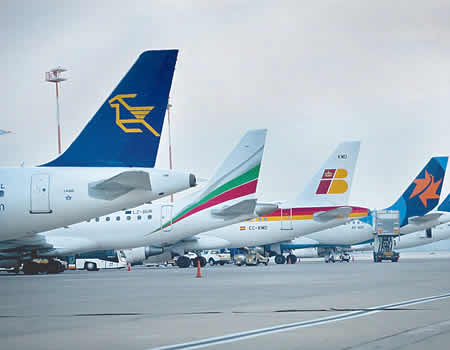Airlines’ trapped funds: Pressure mounts despite $61m release
There’s a mounting pressure on the federal government to make significant releases to clear the foreign airlines’ trapped funds amidst their threat to exit Nigeria. This is despite the release of $61.4m by the Central Bank of Nigeria (CBN) last week as part of efforts to clear outstanding liabilities and bolster the foreign exchange market. […]

FILE PHOTO: Airlines
There’s a mounting pressure on the federal government to make significant releases to clear the foreign airlines’ trapped funds amidst their threat to exit Nigeria.
This is despite the release of $61.4m by the Central Bank of Nigeria (CBN) last week as part of efforts to clear outstanding liabilities and bolster the foreign exchange market.
While there’s no updated data on the foreign airlines’ funds trapped in Nigeria, our correspondent reports that the money was $793m as of December 2023.
According to data from the International Air Transport Association (IATA), Nigeria accounted for a substantial part of airlines’ trapped funds globally.
- Kogi Assembly begins hearing on bill for secondary education board
- Sabalenka fires warning shot with Australian Open masterclass
The foreign airlines said the funds keep mounting hence the $61.4m was too infinitesimal to cover anything.
A foreign airline representative who spoke with our correspondent in confidence said the trapped funds hinder the operations of their airlines.
“We all know what the margin is for airlines. If your funds are trapped to that level, how do you fund your operations? From loans or what? You can fund from other locations for how long? If every nation holds back funds, will there be international flights?
Foreign airlines mull cut of Nigerian operations
Amidst the raging controversy over dollar settlement, airlines are said to be considering the option of reducing or suspending their operations outright.
It was learnt that despite the substantial resolution of diplomatic issues with the United Arab Emirates (UAE), the non-payment of Emirates Airlines’ trapped funds is responsible for the delay in resumption of flights to Nigeria.
“The airline is yet to see sufficient commitment of the Nigerian government to clear Emirates trapped funds which is the major reason for the airline’s suspension of operations in the first place,” the source said.
It would be recalled that Emirates suspended all flights to Nigeria on September 1, 2022 and despite two different visits of President Bola Tinubu to the UAE and follow-up visits by the Minister of Aviation, Festus Keyamo, the airline is yet to agree on resuming flights to Nigeria.
“Yes, the trapped funds issue seems deadlocked,” said a source.
Similarly, other airlines are increasingly restless over their trapped funds, threatening to call it quits in Nigeria as the funds keep increasing.
“It is not a fair competition. My airline flies to Nigeria and our revenue is trapped. A Nigerian airline flies to our base country and they get their monies. Where is the fair competition?,” another foreign airline representative said.
Aviation analyst, Group Capt. John Ojikutu, said aviation agencies would lose 80 per cent of their revenues if foreign airlines should leave in protest.
He said, “80% of our earnings in commercial aviation will be gone if the foreign airlines carry out their threats to withdraw their operations in Nigeria.
“Whoever knows Keyamo should tell him now. Whoever knows Tinubu should tell him now too to tell Keyamo to find out what happened to the forex earnings ($2.5bn) that the Nigeria Aviation service providers collected from the foreign airlines annually? This is not a joking matter like the palliatives and the subsidies.”
The General Secretary of the Aviation Roundtable and Safety Initiative (ART), Mr Olumide Ohunayo, decried a situation where foreign airlines pay for services in Nigeria in dollars yet they cannot get dollars to repatriate their funds.
According to him, if the foreign airlines should leave as being threatened, Nigerian airlines cannot fill the vacuum.
More so he advised that Nigeria should take advantage of the reciprocity in the Bilateral Air Service Agreement (BASA) to begin to operate some of those routes operated by foreign airlines.
He said, “The truth is that our airlines cannot fill the vacuum, that’s almost impossible, as much as I would not advocate for us to increase their frequencies, I think it’s time for us to start using those frequencies that are ours by virtue of the reciprocity in the bilateral service agreement we have with different counties.
